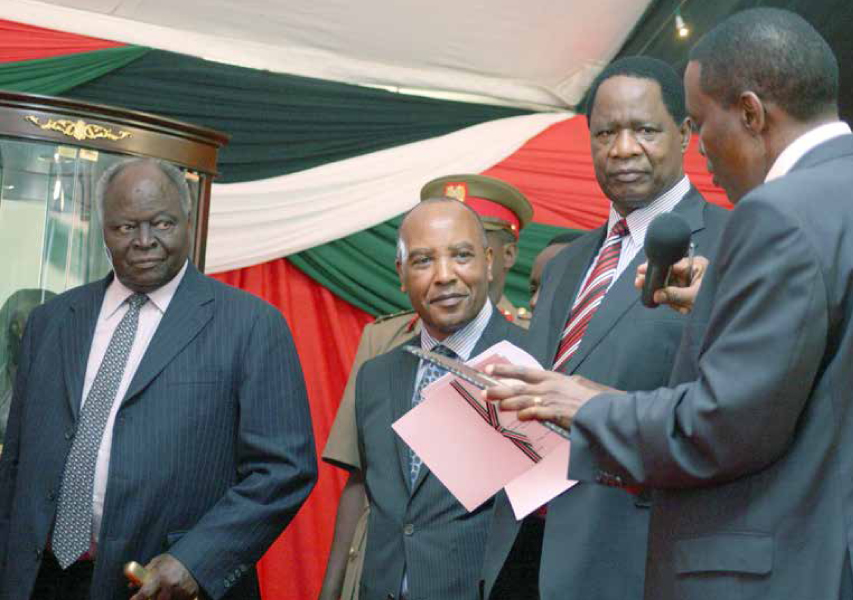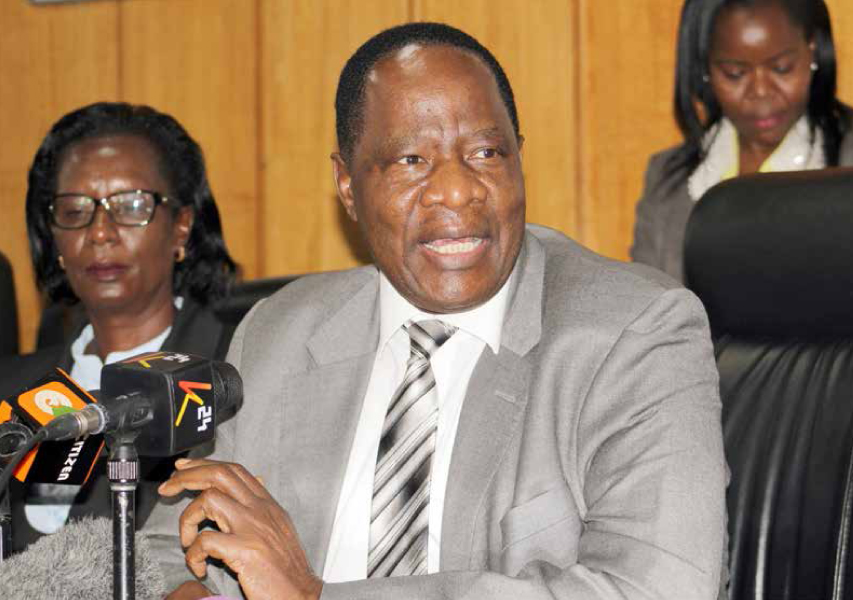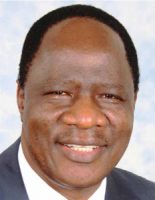
A longtime KANU stalwart in the Moi era, Dalmas Anyango Otieno was perceived as an opportunist among opposition politicians. But when President Mwai Kibaki appointed him minister for Public Service in the Grand Coalition Government, he was tapping into one of the most experienced politicians and bureaucrats well versed in the business of statecraft.
Having been a minister for nearly 10 years, Mr Otieno knew the nooks and crannies of the civil service well enough to fix where it was broken.
Even though he had been a KANU loyalist nearly all his life, he understood that he was serving a reformist government and he went about initiating changes, the most important of which was digitising government services.
Mr Otieno joined Mr Odinga’s Orange Democratic Movement (ODM) in 2007 as the easier route back to politics after staying out in the political cold for five years. That calculation earned him back his old Cabinet seat – this time in the Grand Coalition Government that was formed after the disputed 2007 elections. His party affiliation notwithstanding, it was easy for Mr Kibaki to embrace him because of his wide experience in government and gentlemanly mien. And he did not disappoint. His success was reflected in the many reforms he introduced in the key Ministry of Public Service that Mr Kibaki entrusted him with. Because Mr Otieno was an excellent performer and a stickler for proper procedures and discipline, it was not surprising that Mr Kibaki chose him to head the Ministry of Public Service, which was still bedeviled by corruption and lethargy since the KANU days, the independence party having been trounced only five years earlier.
Mr Otieno knew very well where the rot lay, having been a longtime strategist for President Daniel arap Moi. In an interview for this project, the 75-year-old leader said that under Mr Kibaki, there was much emphasis on performance and productivity, and that he applied the same principles to ensure efficiency in public service. He noted that working under Mr Kibaki was a different ball game in that every issue and project was analysed professionally before implementation and the work had to be completed within the stipulated budget. “There was no room for people creating projects outside the laid-down plans for every ministry,” he said, recalling that Mr Kibaki approached every issue professionally.
Since Public Service ministry was based at Harambee House, Mr Otieno — who was deputised by Assistant Minister Major (Rtd) Aden Ahmed Sugow, with Titus Ndambuki as Permanent Secretary — was in contact with Mr Kibaki virtually every day to consult and exchange views on issues related to his ministry. The towering MP for Rongo in South Nyanza headed the ministries of Industrialisation between 1988 and 1991, Labour and Human Resource Development (1991) and Transport (1991 to 1996.)
Away from administration, Mr Otieno is also a respected boardroom negotiator. In early 2008, when there was an impasse over the division of ministries between Mr Kibaki’s Party of National Unity (PNU) and Raila Odinga’s Orange Democratic Movement (ODM), Mr Otieno came in handy for the latter, their earlier political differences notwithstanding. To get away from the political jostling and wrangling between the two coalition partners for key ministries, President Kibaki and Mr Odinga went for a retreat at Sagana State Lodge, with the President’s trusted ally Francis Muthaura tugging along, while the Prime Minister picked Mr Otieno for the negotiations over portfolio balance.
It was at Sagana that the coalition partners reached a compromise and agreed to share several ministries, even though the ODM rank and file still felt shortchanged in the power-sharing arrangement because PNU retained the key ministries of Finance, Internal Security, Constitutional Affairs, Defence and Foreign Affairs. Some ODM members complained that they had been allocated mere “departments”. But Mr Otieno insists that they worked hard to give every ministry enough portfolio at the Sagana retreat. “Though the Cabinet was large because of the coalition, we ensured that every ministry was assigned some services and that there was no ministry for the sake of it,” he said.
Another illustration of Mr Otieno’s skills in boardroom negotiations was in December 2011 when reports filtered through that he and then Medical Services Minister Prof Anyang Nyong’o had faced off in the Cabinet over the medical insurance scheme for civil servants. Mr Otieno — who had stood in as the Medical Services minister in February 2011 when Prof Nyong’o was undergoing medical treatment in the US — had overturned a medical cover scheme for outpatients that had been put in place by Prof Nyong’o. Appearing before a parliamentary committee on health, Mr Otieno argued that the proposed National Hospital Insurance Fund (NHIF) scheme needed careful analysis because pilot surveys in Mumias and Nairobi alone were not representative. “I am a statistician, and that sample is inadequate,” Mr Otieno, who has a background in insurance, told the committee. “We needed a professionally arranged sample. The scheme must go on because Kenyans need a healthy nation, but in a manner appreciated by the members of the Fund. It has such heavy inbuilt risks.” He further explained that the scheme needed adequate consultations with stakeholders before it could be rolled out, because most Kenyans were not in gainful employment and sustaining the scheme would be difficult. When the issue went to the Cabinet, Prof Nyong’o was of the view that the scheme should be run by NHIF, while Mr Otieno wanted the scheme to be administered by a consortium of at least five private underwriters. The Cabinet voted for Mr Otieno’s version.
One of his landmark achievements as Public Service minister came in December 2011, when he launched digitised government services under the Integrated Records Management System (IRMS), the first step towards paperless record management to deal with the problems of missing files and failure by the government to respond to correspondence from citizens. The IRMS tracked mail and files in the public service, enabling officers to receive files on their desks, access and download the information and move the letter on the system. Under the integrated system, officers were to transfer information in hard copy into the system easily and indicate what action was to be taken or had been taken. Senior officers, including Permanent Secretaries, were then able to monitor whether work had been done or was still pending.
“This is to ensure that Government activities are documented and maintained, with officials getting the right information at the right time and at the least possible cost. The system will enable the protection of Government’s interests, and reduce the risk associated with missing information, and thereby creating opportunities for corruption,” Mr Otieno said when he launched the IRMS at the Kenyatta International Convention Centre on December 19, 2011.
The introduction of the electronic records management system was a great leap in the journey towards creating paperless public service as envisaged in Vision 2030.
But Mr Otieno’s footprints were not confined to Kenya. When neighbouring South Sudan gained its independence in July 2011, his ministry was tasked with helping build a public service for the new nation that was emerging from a debilitating war. To do this, he deployed 72 civil servants to Juba to train South Sudanese personnel so that they could manage their affairs effectively, helping President Kibaki to stamp Kenya’s authority as the big boy of the region.
Mr Otieno was born on April 19, 1945, an eventful year that on the global front marked the end of World War II. Other leaders born in the same year, and who would play influential roles in independent Kenya, include veteran opposition leader Raila Odinga, who was Prime Minister between 2008 and 2013; the late Prof George Saitoti, the country’s longest-serving vice-president; Prof Anyang Nyong’o, a former minister and now governor of Kisumu County; Chirau Mwakwere, also a former minister; as well as Paul Muite, a senior lawyer and former legislator who was key in the Second Liberation movement.

A typical Luo grandee who carries himself with pride and high-society mannerisms, Mr Otieno graduated from the prestigious Makerere University with a Bachelor of Science degree in Applied Economics in 1971. He considered himself a cut above the rest in his Kengeso village in Kamagambo – the Seventh Day Adventists’ hotbed in South Nyanza – and carried himself as such, walking tall and always impeccably dressed. Between 1971 and 1982, the Strathmore College alumnus worked as an accounts manager at the Insurance Agency Management before joining Kenya Commercial Bank as its chairman and director between 1982 and 1985. He had earlier qualified as a Fellow of the Chartered Insurance Institute, London. He then founded Tasley Consultants, of which he was chairman between 1998 and 2001. Earlier, he was treasurer of the Kenyatta University Council from 1983 to 1987.
In 1988, Mr Otieno plunged into politics and won the newly created Rongo Constituency under the ruling party KANU, though he triumphed under the cloud of the controversial queue-voting system. As a statistician, he calculates his political moves carefully, always siding with the powers that be to curve out for himself a place in the politics of the day.
Having been elected in 1988, the first MP for Rongo, which was curved out of Homa Bay Constituency that year, he quickly worked his way into President Moi’s heart, employing his gift of the gab and gentlemanly demeanour to become one of the Head of State’s most trusted stalwarts outside of his Kalenjin inner circle. But come 1992, during the first multiparty elections, Mr Otieno — who still stuck with KANU despite his Nyanza province trooping to the opposition — lost his seat to his uncle Linus Aluoch Polo of Ford Kenya, headed by Jaramogi Oginga Odinga. In 1997, he lost again – this time to newcomer Ochilo Ayacko, who was running on an NDP ticket.
A favourite of President Moi’s, however, Mr Otieno was to remain in Parliament as a nominated MP and minister, in the same manner that the hawkish Joseph Kamotho, from the fiercely opposition stronghold of central Kenya, was perennially appointed minister – for regional representation. Back on his Nyanza turf, Mr Otieno was accused of working with the provincial administration to keep alive the Suba question in a desperate divide-and-rule tactic so KANU could win at least a seat in the strong Ford Kenya zone.
The Suba are a Bantu group who mostly occupy the southern region of Homa Bay County even though they have been assimilated by the more dominant Nilotic Luo for over 200 years, making any effort to evoke nationalistic sentiments in them futile. A relentless Mr Otieno was to play a leading role in keeping the Kuria, another Bantu community, a distinct political hegemony by ensuring it was given its own district out of the larger Migori. The district was for a long time to provide the only KANU seat in the four regions of Migori, Kisumu, Siaya and Homa Bay. Having failed to neutralize Mr Odinga’s influence in Nyanza, Mr Otieno was one of the brains behind the KANU merger with the former’s National Development Party (NDP) in March 2002, as Mr Moi desperately tried to stop a swelling opposition tide that would nonetheless sweep KANU out of power that year. In that election, Mr Otieno lost too to Mr Ayacko of NARC, having stuck with KANU and supported the candidacy of Uhuru Kenyatta. This time he would stay in the political cold as his patron, Mr Moi, had left power and retired and his old KANU party had been vanquished at the polls.
After the routing of KANU, Mr Otieno fell back on his insurance company until 2007, when he joined ODM and edged out Mr Ayacko during the party nominations. He successfully defended his seat in 2013 on an ODM ticket. Viewed all along as a Johnny-come-lately and an opportunist, Mr Otieno’s political fortunes started to plummet in 2014 when he was accused by some ODM leaders of working closely with the government of President Kenyatta, who had defeated Mr Odinga at the polls, earning him the tag of a “mole”. “Dalmas has never been really on our side. He has always been on the other side and he joined us pretending to be sincere but has turned his back on us after we helped him,” Oburu Oginga, Mr Odinga’s elder brother, told a meeting in 2014.
Mr Otieno was among four MPs removed by ODM from their committee assignments for their “cooperation” with the government. Others were Samuel Arama (Nakuru Town West), Ken Obura (Kisumu Central) and Zainab Chidzuga (Kwale County woman rep). However, the four survived when the motion was defeated on the floor of the House. For a man who considered himself an alternative leader in the restive Nyanza region, Mr Otieno never fully embraced Mr Odinga, the de facto leader of his community, even after joining his party, ODM. He was briefly associated with a movement called Kalausi, Dholuo for whirlwind, which tried to sweep Odingaism out of Nyanza ahead of the 2017 elections. But the movement, which also included former Kasipul Kabondo MP Oyugi Magwanga in its ranks, failed to take off, with the two leaders getting punished by voters at the ballot – Mr Otieno in his attempt to retain his old Rongo constituency seat, and Mr Magwanga in his bid to wrest the Homa Bay governorship from the ohangla-loving Cyprian Awiti.
Mr Otieno had said his new party would challenge Odingaism and focus mainly on the development of the region, which had “lagged behind in development because of perpetual political agitation”. The party was, however, never to be. In a recent interview, the 75-year-old politician said that he had never had sour relations with Mr Odinga and that he was just challenging the grassroots to focus on development projects rather than constant politicking.
A moderate on the national political front, Mr Otieno served on the Speaker’s Panel (a pool from which a temporary House Speaker could be picked at any time) between 2008 and 2013. For his moderate demeanour, extensive public service career and old KANU connections, President Kenyatta appointed Mr Otieno his Special Envoy on South Sudan in February 2014, even though he was a senior member of the opposition. As 2017 approached, Mr Otieno started moving closer to Mr Odinga and even competed in ODM primaries in his bid to recapture the Rongo seat, but he lost to Paul Abuor. He proceeded to contest as an independent candidate but lost again.
Following the death of Migori Senator Ben Oluoch Okello in June 2018, Mr Otieno initially expressed interest in contesting the seat on a National Liberal Party (NLP) ticket. He, however, withdrew from the by-election race, settling instead for an appointment to the Salaries and Remuneration Commission (SRC). Mr Otieno argued that he had a personal connection to the SRC because he was the one who established it as minister for Public Service to help manage the public wage bill. He became the vice-chairperson of the commission in September 2018 and has set his eyes on the Migori governor’s seat.
Away from this political juggling, a history of the movers and shakers in President Kibaki’s reformist government will rank Dalmas Otieno, a committed and knowledgeable minister, among the best.
